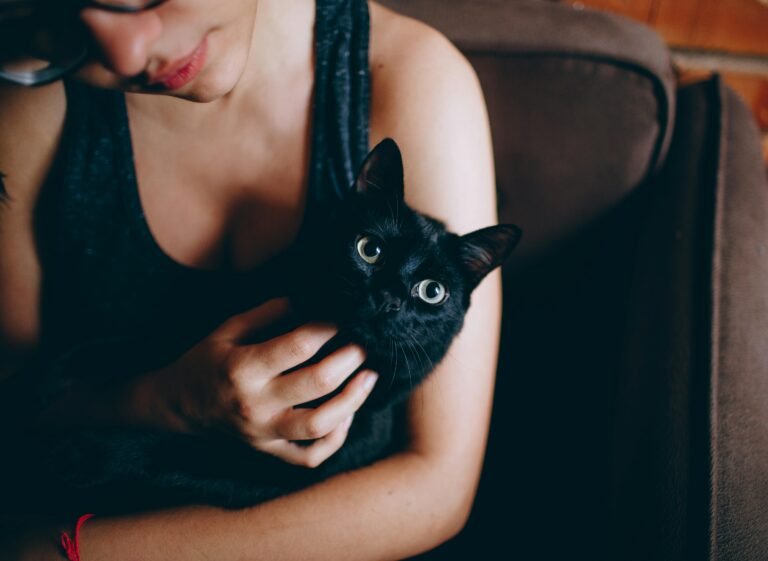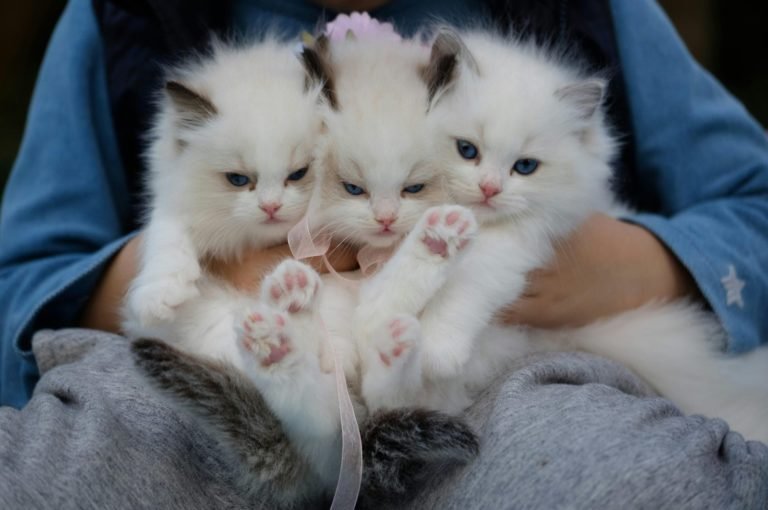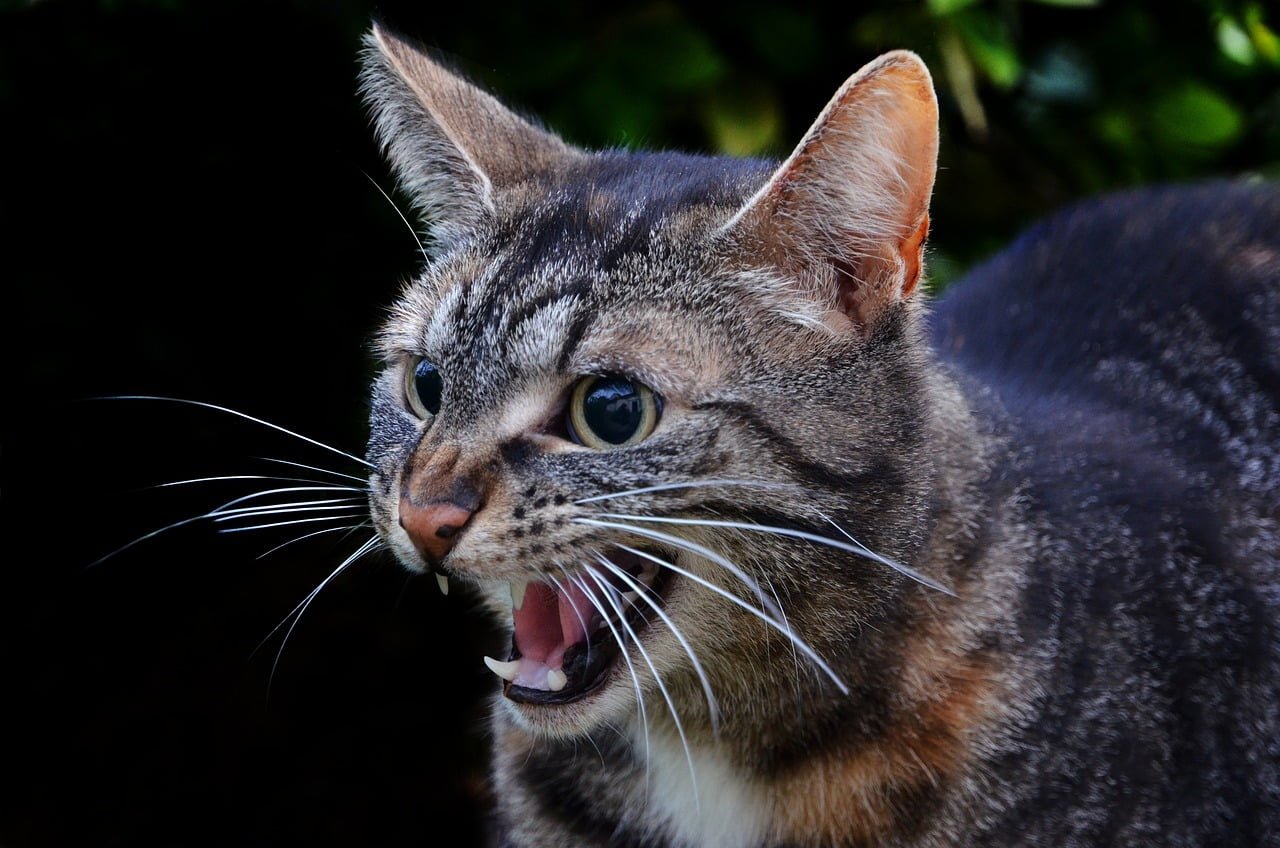
Picture this: You come home from work, and your usually friendly cat, Fluffy, is hiding under the bed. When you try to coax her out, she hisses and swats at you. What’s going on? Chances are, you are witnessing Fluffy exhibiting signs of stress in cats.
Just like people, cats can get stressed out. But unlike us, they can’t tell us what’s bothering them. That’s why it’s so important to learn about the signs of stress in cats. When we know what to look for, we can help our feline friends feel better faster.
Why is it Important to Spot the Signs of Stress in Cats?
Well, stress isn’t just unpleasant for your cat. It can also make your cat sick. Stressed cats might stop eating, have tummy troubles, or even get aggressive. By catching stress early, we can keep our cats healthy and happy.
To understand the signs of stress in cats, we need to learn a bit about how cats “talk” with their bodies. Cats use their ears, eyes, tails, and even their whiskers to show how they’re feeling. When a cat is relaxed, their ears are forward, their tail is up, and their whiskers are spread out. But when they’re stressed, you might see:
- Ears flattened against their head
- Eyes wide open with big pupils
- Tail tucked under or swishing back and forth
- Whiskers pulled back against their face
These are just a few examples of how cats show stress through body language. As we go through this guide, we’ll learn about many more signs to watch for.
Remember, every cat is unique. What stresses out one cat might not bother another. But by learning these common signs, you’ll be better equipped to help your feline friend when they’re feeling under pressure.
Signs of Stress in Cats
When it comes to spotting the signs of stress in cats, it’s crucial to pay attention to both behavioral changes and physical signs. Let’s dive deeper into each of these categories to help you better understand what to look for in your cat.
Behavior Changes
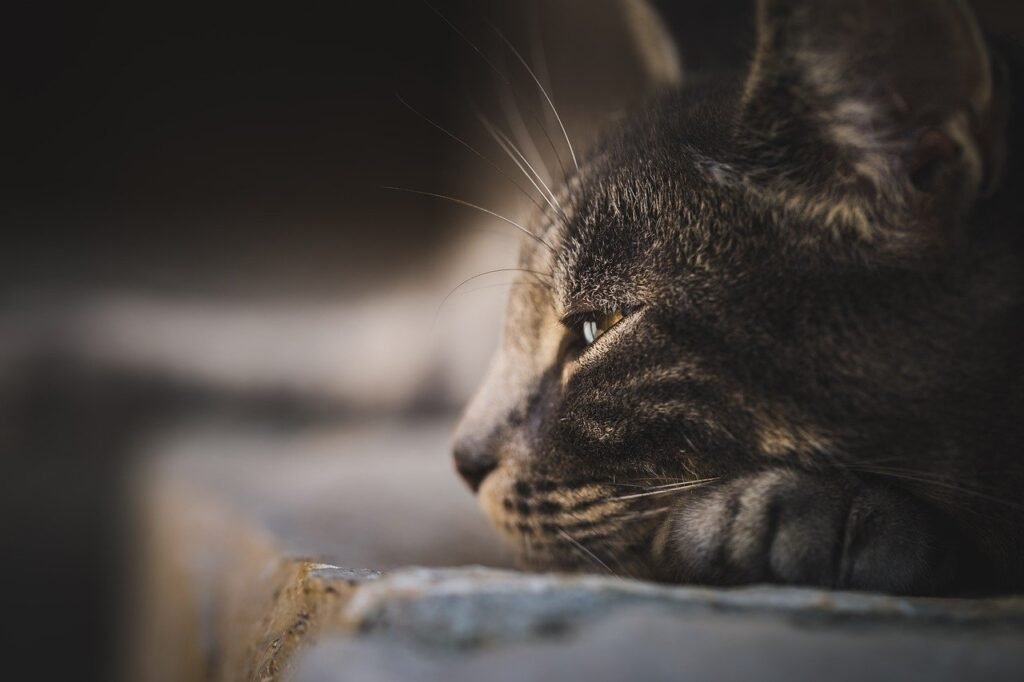
1. Hiding or withdrawal:
Cats are naturally curious creatures who often enjoy being part of household activities. However, when stressed, they might suddenly become reclusive. You might find your usually sociable cat spending hours or even days hidden away in dark, quiet spaces like under the bed, in closets, or behind furniture. This behavior is a cat’s way of seeking safety and comfort when they feel overwhelmed.
For example, if you’ve recently moved to a new home, your cat might hide for several days as they adjust to the new environment. It’s important to provide them with safe, quiet spaces during this time but also to gently encourage them to explore their new surroundings when they’re ready.
2. Litter box problems:
Proper litter box use is a sign of a healthy, happy cat. When cats experience stress, they might start avoiding their litter box or eliminating inappropriate places. This stress could manifest as:
- Peeing outside the litter box, often on soft surfaces like carpets or bedding
- Pooping outside the litter box
- Frequent trips to the litter box without producing much urine
- Crying or meowing while using the litter box
These issues could be due to the cat feeling anxious about using the litter box, perhaps because of its location or because of a negative experience associated with it. For instance, if you’ve recently moved the litter box to a noisier part of the house, your cat might avoid it out of stress.
3. Scratching more than usual:
Scratching is a normal and necessary behavior for cats. It helps them mark their territory, stretch their muscles, and maintain their claws. However, excessive scratching, especially in new areas, can be a sign of stress. You might notice:
- More frequent scratching of furniture, carpets, or walls
- Scratching in areas your cat didn’t scratch before
- Aggressive or frantic scratching behavior
This increase in scratching could be your cat’s attempt to self-soothe or to mark their territory more prominently if they’re feeling insecure.
4. Meowing a lot:
While some cat breeds are naturally more vocal than others, a sudden increase in meowing can indicate stress. Stressed cats might:
- Meow more frequently than usual
- Produce louder or more insistent meows
- Meow at odd hours, like in the middle of the night
- Make different types of vocalizations, like yowling or crying sounds
For example, suppose you’ve recently changed your work schedule and are away from home more. In that case, your cat might start excessive meowing when you’re home as a way of expressing their anxiety about your absence.
5. Getting aggressive:
Cats are generally not aggressive animals, but stress can cause them to lash out. Signs of stress-related aggression include:
- Hissing, growling, or spitting at people or other pets
- Swatting with paws, with or without claws extended
- Biting, even during normally pleasant interactions like petting
- Attacking ankles or feet as people walk by
This behavior might be directed at the perceived source of stress (like a new pet in the home) or at anyone who approaches the cat when they’re feeling overwhelmed.
6. Eating more or less:
Changes in appetite are common signs of stress in cats. You might notice:
- Your cat refusing to eat or eating much less than usual
- Your cat is eating more rapidly or in larger quantities than normal
- Your cat begging for food more often
For instance, a cat stressed by the addition of a new pet to the household might start gulping down their food quickly, fearing the new animal might try to eat it.
7. Over grooming:
While cats are known for their cleanliness, excessive grooming can be a sign of stress. Look out for:
- Your cat spending unusually long periods grooming
- Bald patches or thinning fur, especially on the belly or inner thighs
- Irritated or reddened skin in areas of frequent licking
- Your cat grooming to the point of causing injury to their skin
Over grooming is often a self-soothing behavior for stressed cats, similar to how some humans might bite their nails when anxious.
Physical Signs of Stress in Cats
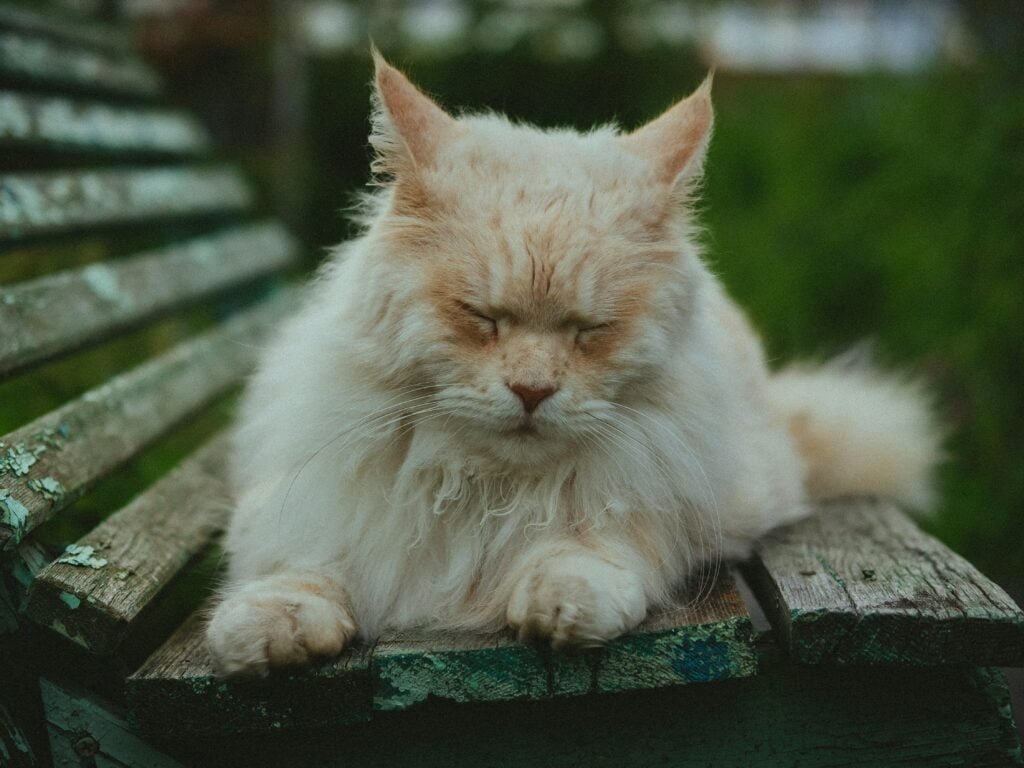
1. Being extra sleepy:
Cats naturally sleep a lot, but stressed cats might sleep even more as a way of coping. Watch for:
- Your cat is sleeping more hours than usual
- Your cat having difficulty waking or seems groggy when awake
- Less interest in play or interaction, preferring to sleep instead
For example, if there’s construction work happening near your home, your cat might spend most of the day sleeping to avoid the stressful noise.
2. Weight changes:
Stress can affect your cat’s weight in either direction. Be alert for:
- Noticeable weight loss, which might be due to decreased appetite or increased activity from anxiety
- Weight gain, which could result from overeating due to stress or decreased activity from depression
These changes often happen gradually, so regular weigh-ins can help you spot trends early.
3. Skin and fur problems:
A cat’s coat is often a good indicator of their overall health and stress levels. Look for:
- Dull, greasy, or unkempt fur
- Increased shedding
- Dandruff or flaky skin
- Redness or irritation on the skin
Stress can affect a cat’s grooming habits and even their skin’s oil production, leading to these issues.
4. Tummy troubles:
Stress can wreak havoc on a cat’s digestive system. Watch for:
- Diarrhea or loose stools
- Constipation
- Vomiting, especially if it happens frequently
- Reduced appetite or refusal to eat
These symptoms might come and go, or they might persist if the source of stress isn’t addressed. If they last more than a couple of days, it’s important to consult with a vet, as they can lead to dehydration and other health issues.
Remember, while these signs can indicate stress, they can also be symptoms of various health problems.
It’s always best to consult with a veterinarian if you notice any of these changes in your cat, especially if they persist for more than a few days. Your vet can help determine if the changes are due to stress or if there’s an underlying medical condition that needs treatment.
Let’s dive deeper into what causes stress in cats. Understanding these causes can help you spot the signs of stress in cats and make your furry friend happier. We’ll break this down into simple parts, so it’s easy to understand.
7 Causes of Stress in Cats
Just like people, cats can get stressed for many reasons. Let’s look at the main things that can make cats feel worried or upset.
Changes in Their Home
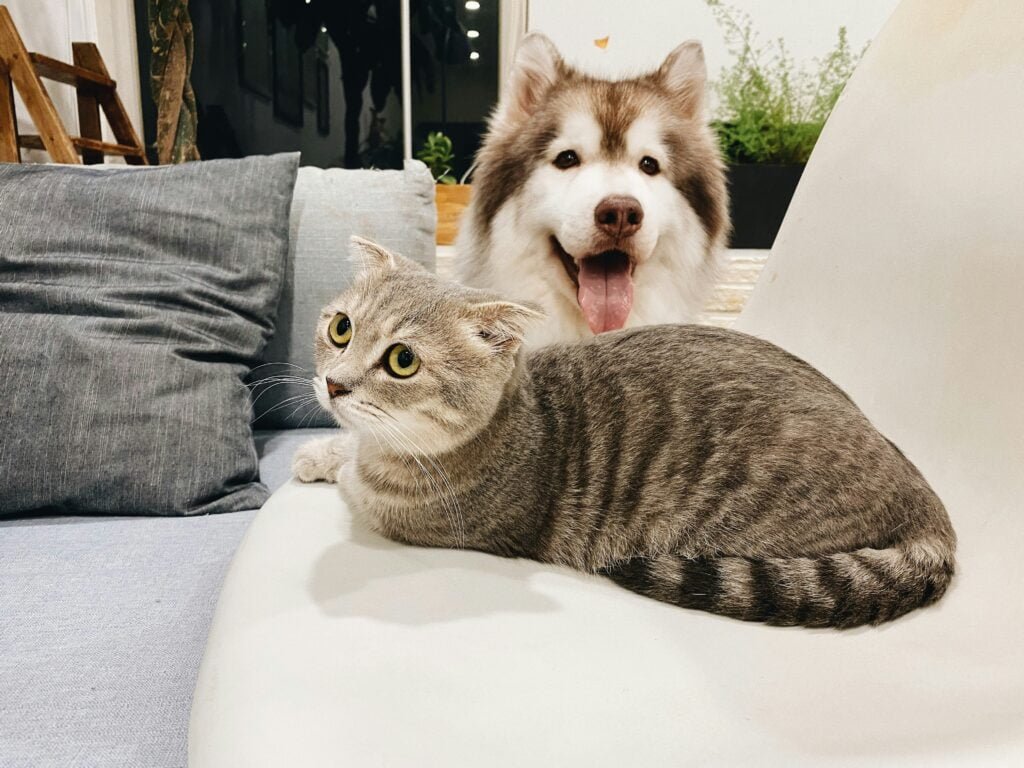
Cats like things to stay the same. When things change at home, it can make them feel stressed. Here are some big changes that might bother your cat:
New Pets:
Imagine if a stranger suddenly moved into your house without asking. That’s how cats might feel when a new pet arrives. They might think:
- “Who’s this new animal in my space?”
- “Will they take my food or toys?”
- “Do my humans still love me?”
These worries can cause signs of stress in cats, like hiding, hissing, or not using the litter box.
Moving to a New House:
Moving is hard for cats. They know every corner of your old home. In a new place, they might:
- Feel scared of new smells and sounds
- Get lost trying to find their food or litter box
- Miss their favorite sunbathing spot
You might see signs of stress in cats who’ve just moved, like meowing a lot or not eating much.
2. Loud Noises:
Cats have very good hearing. Loud noises can really bother them. Things like:
- Thunder during storms
- Construction work outside
- Vacuum cleaners or blenders
These noises might make your cat hide or act jumpy. These are common signs of stress in cats.
3. Changes in Your Schedule:
Cats like routine. If your schedule changes, it can upset them. For example:
- If you start leaving for work earlier
- If you go on vacation and leave them with a sitter
- If you have a new baby who changes when you feed the cat
Your cat might show signs of stress, like overgrooming or being extra clingy when you are home.
4. Social Stress
Cats are social animals, but sometimes, being around others can stress them out. Here’s why: Not Meeting Enough People or Animals When Young.
If kittens don’t meet many people or other pets when they’re little, they might get scared as easily as grown-ups. They might show signs of stress in cats, such as hiding when visitors come over.
5. Bad Past Experiences:
If a cat had a scary experience, they might get stressed in similar situations later. For example:
- A cat that a dog chased might get stressed around all the dogs
- A cat who a child hurt might be scared of all children
These cats might hiss, scratch, or run away in these situations. These are clear signs of stress in cats.
6. Not Enough Space:
Cats need room to climb, hide, and play. Without enough space, they might:
- Fight with other pets more
- Scratch furniture more
- Seem restless or unhappy
These behaviors are all signs of stress in cats who feel crowded.
7. Health Problems
Sometimes, cats act stressed because they don’t feel well. Some health issues that can look like stress are:
Pain:
If your cat hurts, they might act stressed. Things that can cause pain include:
- Sore teeth or gums
- Arthritis in older cats
- Injuries you can’t see
A cat in pain might stop eating, hide more, or get grumpy. These can look like signs of stress in cats.
Thyroid Problems:
If a cat’s thyroid isn’t working right, they might:
- Eat a lot but lose weight
- Seem extra active or nervous
- Have trouble sleeping
These can seem like signs of stress in cats, but they’re actually signs of a health problem.
Bladder Issues:
Cats with bladder problems might:
- Pee outside the litter box
- Cry when they pee
- Go to the litter box a lot
While these look like signs of stress in cats, they could mean your cat has a painful bladder infection.
Skin Problems:
If your cat’s skin is itchy from allergies, they might:
- Scratch a lot
- Overgroom, causing bald spots
- Seem irritable
These can look like signs of stress in cats, but they’re really signs of discomfort.
Why It’s Important to Know the Causes of Signs of Stress in Cats
Understanding what causes stress in cats helps you:
- Spot the signs of stress in cats early
- Figure out why your cat is upset
- Make changes to help your cat feel better
- Know when to take your cat to the vet
Impact of Stress on Cats’ Health
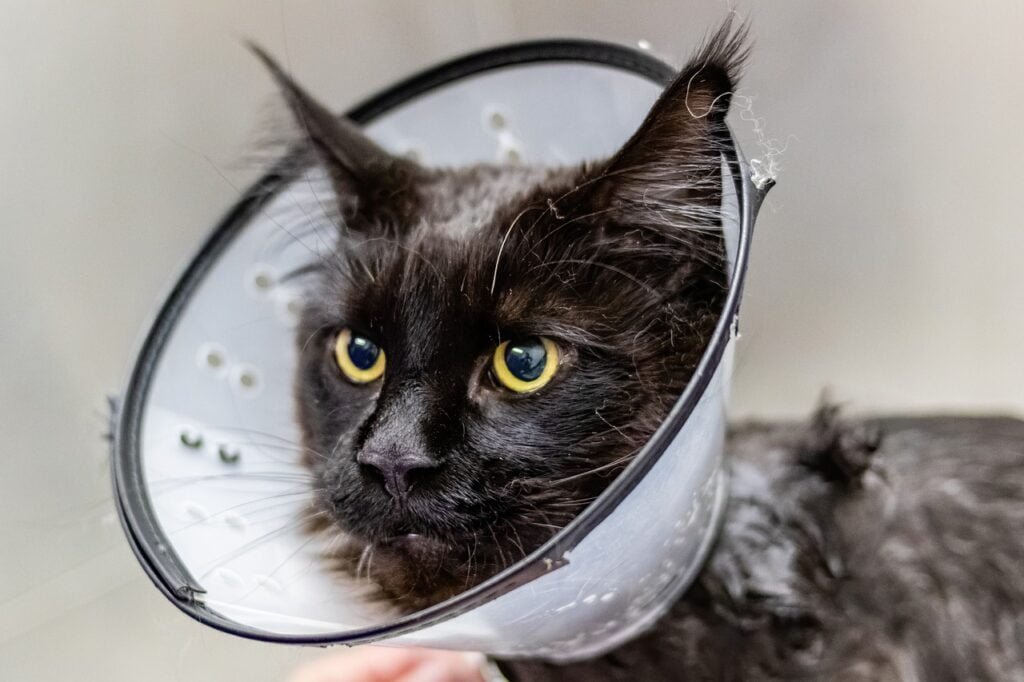
Stress isn’t just unpleasant for cats – it can make them sick. Here’s how stress can affect your cat’s health:
Physical Health Problems
- Weak immune system: Stress can make it harder for your cat’s body to fight off germs. This means stressed cats might get sick more often.
- Tummy troubles: Stress can cause vomiting, diarrhea, or constipation in cats.
- Skin problems: Stressed cats might develop skin rashes or lose fur from overgrooming.
- Bladder issues: Some cats develop painful bladder problems when they’re stressed.
Behavior Problems
- Aggression: Stressed cats might become aggressive, even towards people or animals they usually like.
- Litter box avoidance: Stress can cause cats to stop using their litter box properly.
- Destructive scratching: Cats might scratch furniture or other items more when they’re stressed.
- Overeating or not eating: Some cats eat too much when stressed, while others might stop eating.
As you can see, stress can have a big impact on your cat’s health and behavior. That’s why it’s so important to help your cat manage stress.
Helping Your Stressed Cat
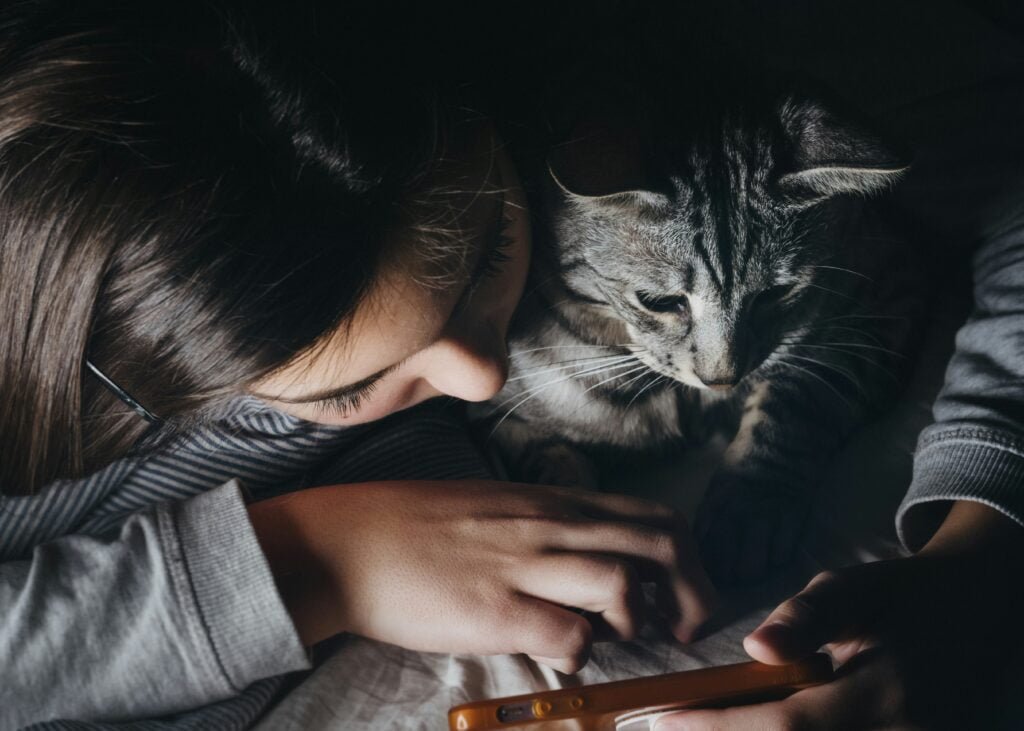
When you see signs of stress in cats, it’s important to take action. Here’s a detailed guide on how to help your furry friend feel better:
1. Find What’s Causing the Stress
This process is like being a detective for your cat. You need to figure out what’s making them upset. Here’s how:
- Watch your cat closely: Look for signs of stress in cats, like hiding more, eating less, or meowing a lot.
- Think about recent changes: Did you move? Get a new pet? Change their food?
- Keep a diary: Write down when you see signs of stress in cats and what’s happening around them.
For example, if your cat starts hiding every time the mailman comes, the loud doorbell might be the cause of stress.
2. Create a Calm Home for Your Cat
Cats love feeling safe and cozy. Here are some ways to make your home more relaxing for your cat:
- Set up hiding spots: Cats love small, enclosed spaces when they’re stressed. You can:
- Put out cardboard boxes with soft blankets inside
- Buy a cat cave bed
- Leave a closet door slightly open
- Give them high places: Cats feel safe when they can look down on their world. Try:
- Getting a tall cat tree
- Clearing off a high shelf for them
- Adding a cat hammock to a window
- Make a cozy bed: Use your cat’s favorite blanket or bed to make a super comfy spot. Put it somewhere quiet, away from busy areas of your home.
- Reduce noise: If loud sounds are causing signs of stress in cats, try:
- Playing soft music or nature sounds
- Using a white noise machine
- Keeping your cat in a quieter room during noisy times
3. Use Positive Training
Positive training means rewarding your cat for calm behavior. It can help reduce signs of stress in cats. Here’s how:
- Give treats: When your cat is relaxed and calm, give them a small treat.
- Offer praise: Use a soft, happy voice to tell your cat they’re good when they’re calm.
- Pet and cuddle: If your cat enjoys it, give them gentle pets when they’re relaxed.
Remember, never punish your cat for showing signs of stress in cats. This can make the stress worse.
4. Try Calming Products
There are special products designed to help reduce signs of stress in cats. One popular option is Feliway. Here’s what you need to know:
- What is Feliway?: It’s a product that copies the scent cats make when they’re happy and relaxed.
- How to use it: You can get Feliway as a spray or a plug-in diffuser. Use it in areas where your cat spends a lot of time.
- Be patient: It might take a few weeks to see a difference in signs of stress in cats.
- Other calming products include:
- Calming collars
- Herbal supplements (always check with your vet first)
- Calming cat music or videos
5. Talk to Your Vet
If you’ve tried these steps and still see signs of stress in cats, it’s time to call the vet. Here’s why:
- Health check: Some health problems can look like stress. Your vet can make sure your cat isn’t sick.
- Expert advice: Vets know lots of ways to help stressed cats. They might suggest:
- Special diets for stressed cats
- Safe medications to reduce anxiety
- Changes to your home that can help your cat
- Ongoing care: Your vet can help you make a long-term plan to keep your cat happy and stress-free.
Remember, it’s always better to ask for help if you’re worried about your cat.
6. Be Patient and Consistent
Helping a stressed cat takes time. Here are some tips to remember:
- Please don’t give up: It might take weeks or even months to see big changes.
- Keep a routine: Cats like it when things stay the same. Try to feed them and play with them at the same time each day.
- Watch for small improvements: Even little changes in signs of stress in cats are good news!
- Give lots of love: Your cat needs to know you care. Spend quiet time with them every day.
Conclusion
Recognizing signs of stress in cats is a crucial skill for any cat owner. By learning to spot these signs early, we can help our feline friends live happier, healthier lives.
When cats are stressed, it can affect their health and behavior. That’s why it’s so important to address stress quickly. Creating a calm environment, using positive reinforcement, and working with your vet are all great ways to help a stressed cat.
Every cat is unique, so what works for one might not work for another. Don’t be afraid to try different approaches to find what helps your cat best. And remember, if you’re ever unsure about your cat’s behavior or health, it’s always best to consult with a veterinarian.
By being attentive to our cats’ needs and responding to signs of stress, we can build stronger bonds with our feline friends and ensure they live their best lives. After all, a happy cat means a happy home!

